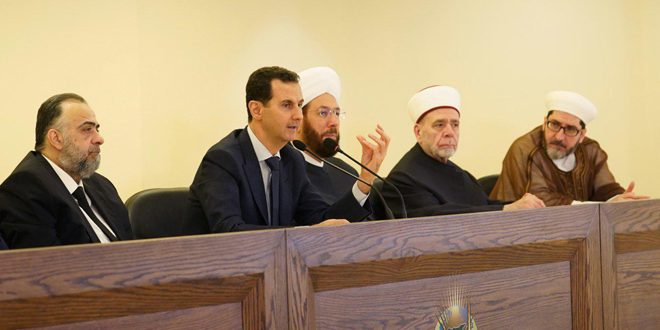On Monday, President Bashar al-Assad inaugurated the International Islamic Sham Center for confronting terrorism and extremism, affiliated to the Endowments Ministry.
The President toured the center and listened to a brief speech by Sheikh Afyouni about the sections it includes, mainly, the National Institute for qualifying Imams and preachers in all cities, the International Institute for the Arab and Religious Sciences, for those who wish to study the religious sciences from countries of the Levant, as well as a section for monitoring extremist mentalities.
The Center also includes a section on combating extremist mentalities, a scientific research center, a library and a number of auditoriums.
Later, President Assad met a number of Damascus scholars who attended the opening ceremony and delivered a speech in which he said that fulfilling this center and launching its works in this holy month is an indication and a message that this month is the month of work, not a month of delay or laziness as some people perceive.
Assad said, “If we ask any Syrian citizen about where we stand after nine years of war, in the framework of terrorism and extremism, the answer maybe, for the majority of the Syrians, that this extremism led to our current state. I say this is a normal reaction because sectarian ideas were used as a tool at the very beginning of the war.
“I say with confidence, that vision is unrealistic and untrue… the situation today for Syrian society is not only better from the beginning of the war, but it is also better than the stage before the war,” President Assad said.
He added that, “It is true that that war was external, but the elements were internal… this made us revise our vision of ourselves as Syrians across all spectrum, to make contact with ourselves more.”
“The lesson that we have learned from the war was a lesson that taught us to distinguish .. why the situation is better than the time before war. Today we can better distinguish our society from the stage before war,” the President said.
He added that when the war came, “We have seen the results, we have started to distinguish between a religious man and a fanatic, we began to distinguish between religion as a tool for building and fanaticism as a tool for destruction.”
President Assad went on to say that, “The only place in the State that depends on religion in a direct way is as a law.. it’s the personal law… marriage, divorce, inheritance and others, and even in this law there is a freedom to all sections of society as to decide which issues suit them. This law, which depends on religions, is secular because it leaves a freedom… so there is no relation between secularism and religion… atheism is atheism and belief is belief… so I say that the situation today is better than before the war. This means we can have a clear vision.. and when we can see clearly, we can protect and preserve the country, and protect what is related to it as policy, morals, patriotism and so on.
“The suffering during that war was connected to religious extremism… sure, this extremism became an international concern after the 9/11 attacks in New York as you all know… and wahhabism has contributed to consolidating this image to become a reality… even terrorism in Syria was not stemmed from Syrian traditions, but it came from outside, and it became a reality in Syria… so it is a social product, and you will not succeed in this task in this center, on social media or in your mosques without treating the gaps, which became present in this society that produce an extremism and then becomes a religious mentality,” President Assad said.
This article was edited by The Syrian Observer. Responsibility for the information and views set out in this article lies entirely with the author.


